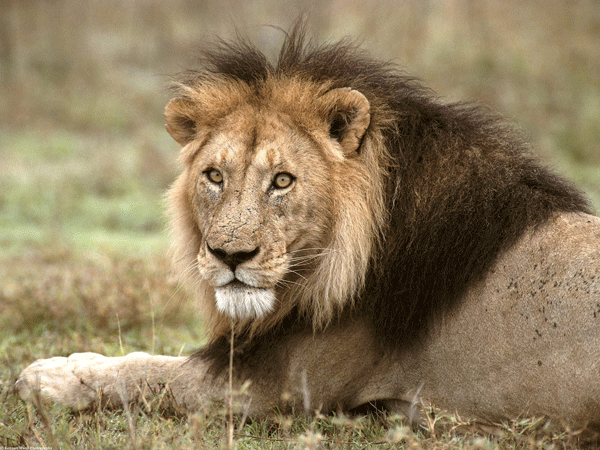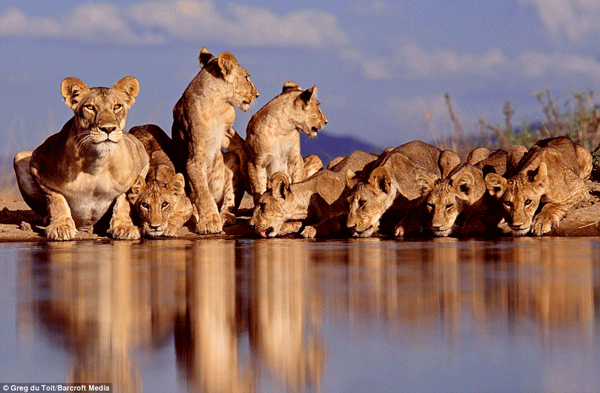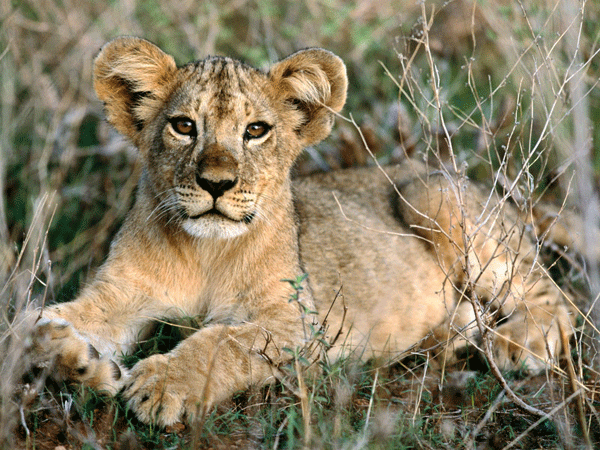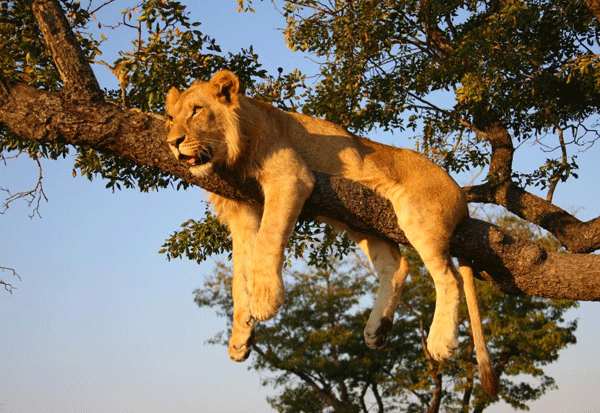Kenya has long since abolished trophy hunting in favour of protecting its wildlife and has opted for ecotourism instead. Last December, for the first time, the Maasai Olympics were held as a competitive replacement for traditional lion hunting; yet another Kenyan stride to preserve its precious ecosystem. Zambia and Botswana took a united stand against hunting and have both issued laws against the trophy killings. As of 2014, lions in these countries will be safe from the legal hunt for their heads – a hugely important step in conserving the species and maintaining the sheer magnificence of some of Southern Africa’s most premier wildlife areas.
Conversely, Tanzania’s wildlife authorities steadfastly support its ‘sustainable’ hunting practice, claiming their stronghold lion population can be attributed to its hunting industry. South Africa, Namibia and Zimbabwe also sell their wild lions to trophy seekers in the name of income and conservation, the argument being that the millions of US$ brought into the country through big game hunting is what is sustaining ecosystems and local communities. What needs to be understood is that we are no longer living in an Africa that is overflowing with wildlife, we are no longer on prime hunting ground; we are now the keepers of a land that is losing its enchantment at a rate of knots. Lions are declining at a rapidity of 5-8% per year, according to renowned filmmaker and founder of Big Cats Initiative, Dereck Joubert. Over the last 50 years, we have lost almost all of Africa’s lions – 95% have died due to human ignorance and greed. This fast decline calls for change. We cannot carry on hunting lions in the face of a crisis that is screaming towards the ultimate extinction of Africa’s biggest cat.

I asked Dereck what he believes is the most destructive force against lions in Africa and his simple answer succinctly pinpointed humans. He continued, “Roughly 25% of the lions killed today are from trophy hunters. I pick them first because this is something we can restrain ourselves from doing and in a stroke, save 556 male lions of the possibly 2500 males left.” It’s as straightforward as a mathematical equation, which should mean that it is not up for debate. Aside from the numbers and the studies that have traced the reasons behind the hurtling demise of this irreplaceable species, there are such saddening truths about where these lions have come from and how they land up on hunting ranches. If the facts don’t get to you, the unethicality of this practice should.
An article published in the Times Live revealed that at least five South African farmers had been accused in an inter-border lion smuggling case in order to benefit their hunting businesses. Wildlife smuggling and the trade in exotic animals happens in Southeast Asia, Thailand and Laos according to reports, but this was a blood-curdling tale of farmers receiving lion cubs that had been stolen from Bostwanan lionesses after having shot the suckling mothers. The Problem Animal Control Group is in place to deal with predators causing problems in Botswana, but have instead contacted South African farmers who, for a price, can benefit from this undercover dealing. The mother lioness is shot and her body buried, while her cubs are smuggled into a life of captivity until they are earmarked for a hunt in which they will be shot 48 hours after being released into the veld for the first time in their stunted lives. The buried mother? Well, she’s dug up and taken apart to sell to Vietnam because ill-informed (or determinedly ignorant) people are not only after her cubs, they’re after her skin, claws and bones too.

The approach of ‘sustainable hunting’ has been knocked down by the best of the conservational thinkers and leaders in the field. Adam Cruise, philosopher and author of ‘In the Pursuit of Solitude’, addressed my question on the topic: “The problem with the hunting-as-conservation argument is that it is often thrown up as the ONLY alternative to conserving wild lions. This is simply not the case. Besides, even as an alternative it is questionable whether such practices do in fact conserve wild lions. Those that are in favour of hunting point to the obvious economic benefit, but a benefit for whom? The lions? The property owners? The rangers? Local government? Local community? The real issue here is that there are other alternatives. Here’s a novel one: let’s not kill lions at all. If we were to prevent the killing of lions absolutely and completely, whether from poaching or hunting, would that not conserve them too?”
Due to the fact that we are facing a tragedy of irreversible proportions should we allow lions to become extinct, it is necessary to bite the bullet and look at conservational methods that might save the species, but that also speak volumes of the greediness and corruption that has leaked into our humanness. The notion of farming a population of lions to be hunted is based on the assumption that the wild lions will be left alone to breed and regrow the population, while hunters will still get their fix. Dereck eloquently explained to me precisely why this won’t work: “If you speak to hunters, there are two distinct kinds of people who hunt lions. Those that want the real experience and those that want the trophy. Wild versus Canned. There is no overlap between the two. Canned lions will not substitute for wild lions for hunting, and do not alleviate the pressure on wild populations.”
In addition to this, he pointed out that, “Botswana has shut down hunting because it wants to protect its wildlife, but also because hunter’s gunshots mask poaching activity, making it difficult to follow up.” The fact that poaching is systematically wiping out hundreds of rhinos and elephants every year means that we cannot afford to miss the signals. To risk mistaking a gunshot for a hunter’s is an insult to the anti-poaching troops that tirelessly track and trace the signs that more often than not lead to the most horrific and demoralising crime scenes.

David Bristow, author of ‘Africa’s Finest’ among other environmental masterpieces, puts into perfect words exactly what ‘farmed’ lions means: “For me, farming lions is as sick as farming battery chickens, or cow factories that are so prevalent today. The appeal of lions is their wildness, their untameability. To tame them is to make a mockery of their lion-ness.”
Aside from David’s passionate perspective on the immorality of a practice such as this, there is a perfectly good economical reason for why we cannot sustainably hunt these sought after creatures. Dereck responded to my hypothetical proposal with the following:
“1 Billion People sized market, 6,000 lions in captivity. Captive bred lions (or rhinos) will never keep up with the demand of this market. What legal, farm-raised lions and rhinos will do is feed and grow the market (who would commercially farm with the intention of flooding the market anyway?), but also create a grey market of confusing, legal trade masking the illegal trade … 100 Years ago, maybe farmed tigers or rhinos might have been an option when the world’s population of humans was 1.5 billion and the rhinos numbered 3 million. Today the scales are wrong.”
The idea of ‘sustainable hunting’ as conservation is not merely rejected, it is countered by the far stronger, entirely ethical, supportive structure of ecotourism. The revenue that is said to carry so much weight in the tourism industry in Africa is matched and beaten by the income that is brought in through community involvement, local employment and eco-safaris. It overrides the monetary benefits that hunting farms are basing their arguments on. David explains, “What is needed most is for safari operators to enter into partnerships with their neighbouring communities to make things work, to share equitably in the spoils of tourism and make wild habitat and lions included. It is really up to the safari industry, simple as that.”
When we weigh hunting and ecotourism against each other in a contest vying for conservational credit, it is not simply a matter of a moral code, it is a matter of saving a species. In this case, it is the lion. The leader of the African ecosystem, an icon; or, a desired wall-trophy and a lifeless reminder of a bullet shot, once, in Africa. It is essential that we do not lose this remarkable species, and the facts are that using lion farms for product trade and hunting purposes poses unconquerable risks.
Adam emphasises, “Can we afford to risk tempting the insatiability of the exponentially burgeoning market from Asia? Do we and will we ever have enough lions to satiate this demand? It’s a move that’s simply too risky to make. Being wrong means that lions may never avert extinction. ‘Farmers’ of lions charge top dollar to hunt a lion – this is out of reach of most local Africans who would still succumb to the temptation to poach, especially if the demand for lion products remains. Poaching will not cease because of professional hunting, and in fact may even increase accordingly.”

We cannot afford to have lions readily available for the public’s consumption and for hunters’ satisfactions, because those desires are, as Adam said, insatiable. Developments in ecotourism are proving to be a flying success, and people living rurally in Africa are being approached by initiatives promising to employ them and incentivise their communities in order to conserve the wildlife that this continent’s health and wealth depends on. How hypocritical does it seem, then, to want to provide captive-bred lions just to satisfy people’s desire to kill? Lions, elephants and rhinos are out of the question – it is not sustainable; there are not enough numbers for trigger happy humans to mount their taxidermy art on their walls. It is a shock to realise that the greed of people has led us to a point where we are scrambling to save a species, so much so, that we breed lions just so we can kill them.
The input I received from Dereck, Adam and David on this topic could not have been more eloquently summarised than by the following:
“Earth provides enough to satisfy every man’s needs, but not every man’s greed.”
That, of course, was Gandhi.
Chloe Cooper

